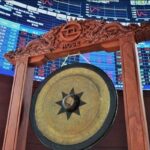
- EUR/USD may appreciate as the US Dollar struggles due to rising expectations the Fed cutting interest rates.
- US ADP Employment Change fell by 33,000 in June, against the downwardly revised 29,000 gain in May.
- ECB policymaker Pierre Wunsch said, “I am not uncomfortable with the market’s interest rate expectations.”
EUR/USD remains subdued for the second successive session, trading around 1.1800 during the Asian hours on Thursday. The pair may regain its ground as the US Dollar (USD) loses ground amid rising expectations that the Federal Reserve (Fed) will cut interest rates, driven by the downbeat ADP national employment report.
US ADP Employment Change fell for the first time in more than two years in June. The private-sector payrolls decreased by 33,000 in June after a downwardly revised 29,000 gain in May. This figure came in below the market consensus of 95,000.
Traders await highly anticipated labor market data, including US Nonfarm Payrolls (NFP) and Average Hourly Earnings, due later in the day. Moreover, ISM Services PMI and S&P Global US PMI will also be eyed on Thursday.
Latest remarks from several European Central Bank (ECB) officials on the ECB forum highlighted increasing concern over the Euro’s (EUR) strength and its potential dampening effect on inflation.
ECB policymaker Pierre Wunsch said on Wednesday that “I am not uncomfortable with the market’s interest rate expectations.” “There is an argument for providing a mildly supportive policy stance,” Wunsch added. Meanwhile, ECB member Olli Rehn said, “ECB should be mindful of the risk that inflation stays persistently below 2% target.” Rehn noted that the “joint European borrowing to finance defence could bolster the Euro’s role by creating a new safe asset.”
Euro FAQs
The Euro is the currency for the 19 European Union countries that belong to the Eurozone. It is the second most heavily traded currency in the world behind the US Dollar. In 2022, it accounted for 31% of all foreign exchange transactions, with an average daily turnover of over $2.2 trillion a day. EUR/USD is the most heavily traded currency pair in the world, accounting for an estimated 30% off all transactions, followed by EUR/JPY (4%), EUR/GBP (3%) and EUR/AUD (2%).
The European Central Bank (ECB) in Frankfurt, Germany, is the reserve bank for the Eurozone. The ECB sets interest rates and manages monetary policy. The ECB’s primary mandate is to maintain price stability, which means either controlling inflation or stimulating growth. Its primary tool is the raising or lowering of interest rates. Relatively high interest rates – or the expectation of higher rates – will usually benefit the Euro and vice versa. The ECB Governing Council makes monetary policy decisions at meetings held eight times a year. Decisions are made by heads of the Eurozone national banks and six permanent members, including the President of the ECB, Christine Lagarde.
Eurozone inflation data, measured by the Harmonized Index of Consumer Prices (HICP), is an important econometric for the Euro. If inflation rises more than expected, especially if above the ECB’s 2% target, it obliges the ECB to raise interest rates to bring it back under control. Relatively high interest rates compared to its counterparts will usually benefit the Euro, as it makes the region more attractive as a place for global investors to park their money.
Data releases gauge the health of the economy and can impact on the Euro. Indicators such as GDP, Manufacturing and Services PMIs, employment, and consumer sentiment surveys can all influence the direction of the single currency. A strong economy is good for the Euro. Not only does it attract more foreign investment but it may encourage the ECB to put up interest rates, which will directly strengthen the Euro. Otherwise, if economic data is weak, the Euro is likely to fall. Economic data for the four largest economies in the euro area (Germany, France, Italy and Spain) are especially significant, as they account for 75% of the Eurozone’s economy.
Another significant data release for the Euro is the Trade Balance. This indicator measures the difference between what a country earns from its exports and what it spends on imports over a given period. If a country produces highly sought after exports then its currency will gain in value purely from the extra demand created from foreign buyers seeking to purchase these goods. Therefore, a positive net Trade Balance strengthens a currency and vice versa for a negative balance.
Information on these pages contains forward-looking statements that involve risks and uncertainties. Markets and instruments profiled on this page are for informational purposes only and should not in any way come across as a recommendation to buy or sell in these assets. You should do your own thorough research before making any investment decisions. FXStreet does not in any way guarantee that this information is free from mistakes, errors, or material misstatements. It also does not guarantee that this information is of a timely nature. Investing in Open Markets involves a great deal of risk, including the loss of all or a portion of your investment, as well as emotional distress. All risks, losses and costs associated with investing, including total loss of principal, are your responsibility. The views and opinions expressed in this article are those of the authors and do not necessarily reflect the official policy or position of FXStreet nor its advertisers. The author will not be held responsible for information that is found at the end of links posted on this page.
If not otherwise explicitly mentioned in the body of the article, at the time of writing, the author has no position in any stock mentioned in this article and no business relationship with any company mentioned. The author has not received compensation for writing this article, other than from FXStreet.
FXStreet and the author do not provide personalized recommendations. The author makes no representations as to the accuracy, completeness, or suitability of this information. FXStreet and the author will not be liable for any errors, omissions or any losses, injuries or damages arising from this information and its display or use. Errors and omissions excepted.
The author and FXStreet are not registered investment advisors and nothing in this article is intended to be investment advice.
Editors’ Picks

EUR/USD consolidates gains near 1.1700 ahead of US data
EUR/USD is consolidating its latest upside near 1.1700 in European trading on Thursday. The US Dollar remains weak across the board as investors stay wary about the future of the Fed’s independence in Trump’s 2.0 era. The focus now shifts toward ECB-speak and mid-tier US data for fresh impetus.

GBP/USD stays firm above 1.3700, near fresh multi-year highs
GBP/USD holds its winning streak for the fourth successive session, trading above 1.3700 in the European session on Thursday. The pair hangs close to three-year highs amid sustained US Dollar weakness, in light of US President Trump’s fresh attack on the Fed’s credibility. US data and BoE-speak awaited.

Gold price retains its positive bias amid a broadly weaker USD; lacks bullish conviction
Gold price trades with a mild positive for the second straight day on Thursday, though it lacks follow-through and remains below the $3,350 level through the early European session. Reports that US President Donald Trump was considering replacing Federal Reserve Chair Jerome Powell raised concerns over the future independence of the US central bank.

Could Iran block the Strait of Hormuz? Why Oil is on edge after US strikes
As the Israel-Iran conflict reaches new heights, an old threat is coming back to haunt the markets: that of the closure of the Strait of Hormuz. This narrow arm of the sea in the Persian Gulf, wedged between Iran to the north and the United Arab Emirates and Oman to the south, is much more than a simple sea passage.

The Best brokers to trade EUR/USD
SPONSORED Discover the top brokers for trading EUR/USD in 2025. Our list features brokers with competitive spreads, fast execution, and powerful platforms. Whether you’re a beginner or an expert, find the right partner to navigate the dynamic Forex market.








